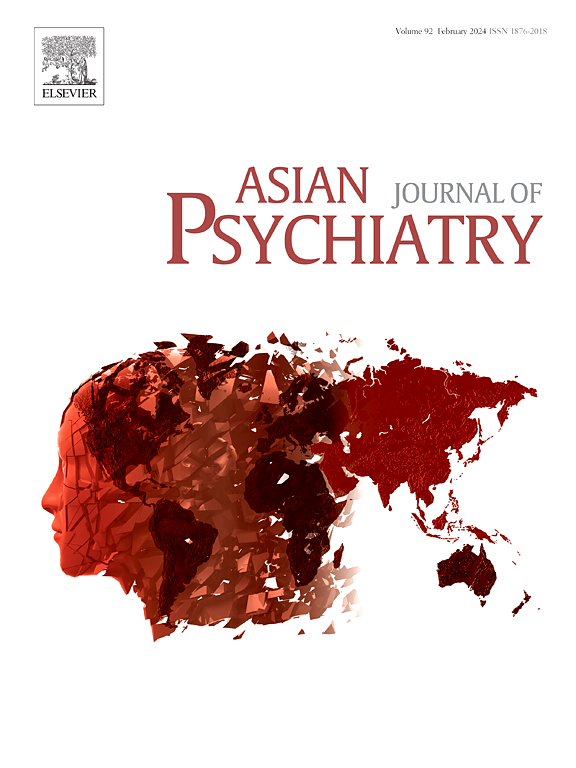The effects of non-invasive brain stimulation on cognitive impairment in depression: A systematic review and meta-analysis
IF 3.8
4区 医学
Q1 PSYCHIATRY
引用次数: 0
Abstract
Background
Cognition is commonly compromised in depression, and non-invasive brain stimulation (NIBS) has been well-established in the treatment of depression, but its efficacy for treating cognitive deficit has not been fully elucidated. Based on the available evidence on NIBS, we conducted a meta-analysis to systematically assess the efficacy of NIBS in improving cognitive deficits in depressed patients.
Methods
A literature search was conducted in PubMed, Web of Science, Embase, Ovid MEDLINE, and Cochrane Library databases up to February 20, 2025. we separately assessed the effects on: global cognitive function, learning and memory, working memory, language, psychomotor speed, attention, visuospatial ability, and domains of executive function (including attentional switching, verbal fluency, inhibitory control, and cognitive flexibility).
Results
A total of 23 randomized controlled trials (n = 1267) were included in this study. Analyses showed that NIBS produced significant improvement in the domains of global cognitive function (SMD=0.24, 95 % CI [0.03, 0.46]) and learning and memory (SMD=0.46, 95 % CI [0.06, 0.85]). Subgroup analyses showed that transcranial magnetic stimulation (TMS) was significantly better than the placebo control group in terms of global cognitive function improvement (SMD=0.32, 95 % CI [0.07, 0.57]). However, other cognitive dimensions showed no significant improvement with NIBS
Conclusion
Our findings suggest that NIBS has significant efficacy on global cognitive function, learning and memory in depressed patients. Effects on other domains were not significant. Future high-quality studies are needed to validate which stimulation programs are most effective.
非侵入性脑刺激对抑郁症患者认知障碍的影响:一项系统综述和荟萃分析
抑郁症患者的认知能力普遍受损,非侵入性脑刺激(NIBS)在抑郁症的治疗中已得到证实,但其治疗认知缺陷的疗效尚未完全阐明。基于NIBS的现有证据,我们进行了一项荟萃分析,以系统地评估NIBS在改善抑郁症患者认知缺陷方面的疗效。方法采用截至2025年2月20日的PubMed、Web of Science、Embase、Ovid MEDLINE、Cochrane Library数据库进行文献检索。我们分别评估了对整体认知功能、学习和记忆、工作记忆、语言、精神运动速度、注意力、视觉空间能力和执行功能领域(包括注意力转换、语言流畅性、抑制控制和认知灵活性)的影响。结果共纳入23项随机对照试验(n = 1267)。分析表明,NIBS在整体认知功能(SMD=0.24, 95 % CI[0.03, 0.46])和学习记忆(SMD=0.46, 95 % CI[0.06, 0.85])方面有显著改善。亚组分析显示,经颅磁刺激(TMS)组在整体认知功能改善方面明显优于安慰剂对照组(SMD=0.32, 95 % CI[0.07, 0.57])。结论NIBS对抑郁症患者的整体认知功能、学习记忆有显著的改善作用。对其他领域的影响不显著。未来需要高质量的研究来验证哪种刺激方案最有效。
本文章由计算机程序翻译,如有差异,请以英文原文为准。
求助全文
约1分钟内获得全文
求助全文
来源期刊

Asian journal of psychiatry
Medicine-Psychiatry and Mental Health
CiteScore
12.70
自引率
5.30%
发文量
297
审稿时长
35 days
期刊介绍:
The Asian Journal of Psychiatry serves as a comprehensive resource for psychiatrists, mental health clinicians, neurologists, physicians, mental health students, and policymakers. Its goal is to facilitate the exchange of research findings and clinical practices between Asia and the global community. The journal focuses on psychiatric research relevant to Asia, covering preclinical, clinical, service system, and policy development topics. It also highlights the socio-cultural diversity of the region in relation to mental health.
 求助内容:
求助内容: 应助结果提醒方式:
应助结果提醒方式:


